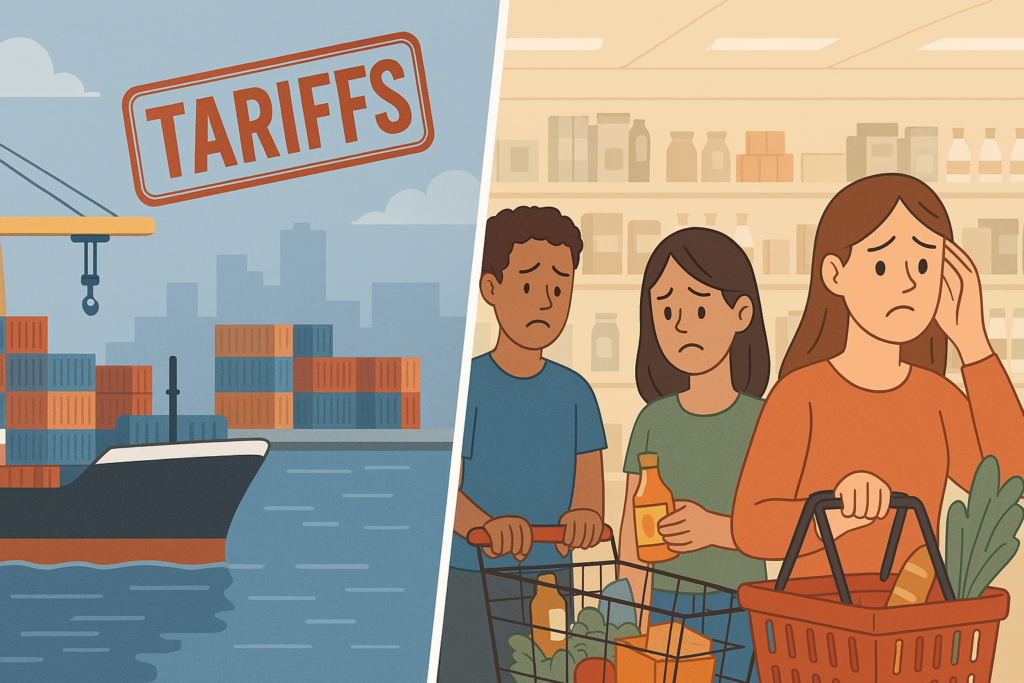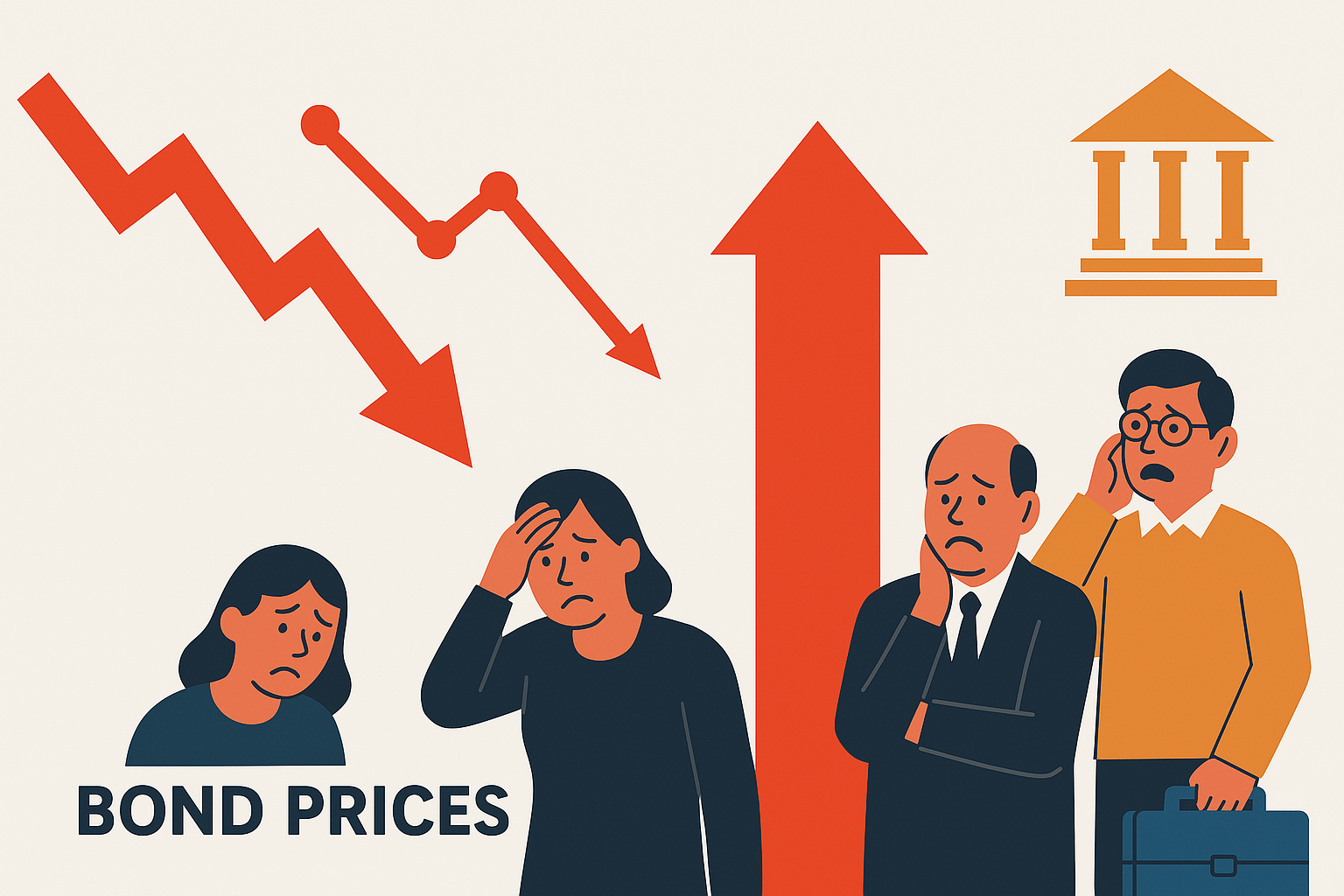On Wednesday, President Donald Trump surprised many people by pausing most of his new tariffs, or taxes on goods from other countries, just one week after announcing them. He decided to stop most of these tariffs for 90 days, except those placed on China and a few other countries.
At first, the White House said this pause was due to President Trump’s successful negotiations, claiming the tariffs helped him reach better trade agreements. However, many experts say the real reason behind his decision was problems in something called the bond market, a very important financial market for the United States.
Bonds are a way that governments borrow money. The U.S. government sells bonds to investors, including other countries, banks, and regular people. When President Trump announced his new tariffs, many investors started worrying. This caused bond prices to drop very quickly, and when bond prices fall, the interest rates—or how much the government has to pay investors to borrow money—go up.
This sudden rise in interest rates can hurt the whole economy by making borrowing more expensive for everyone, from families buying homes to businesses expanding. “U.S. Treasury debt is the risk-free asset of the world,” said Gennadiy Goldberg, an expert from TD Securities. “If there are questions about investors’ willingness to buy it… it really threatens the primacy of U.S. treasury debt as the rock that underpins the global financial system.”
One of Trump’s economic advisors, Kevin Hassett, admitted that “there’s no doubt” these bond market problems made the decision to pause tariffs more urgent.

Additionally, experts saw other reasons behind the decision. Falling oil prices, for example, showed a possible drop in economic activity due to the tariffs. Less economic activity means less oil demand, leading to lower prices. Moreover, some very wealthy and influential investors, like billionaire Bill Ackman, warned strongly against Trump’s tariffs, calling them “economic nuclear war on every country in the world.”
Former U.S. Treasury Secretary Lawrence Summers warned that the tariffs could trigger a serious financial crisis. Current Treasury Secretary Scott Bessent initially tried to downplay the crisis but later supported the decision to pause tariffs.
Though the tariff pause might help calm the markets temporarily, some damage was already done. Confidence in the economy and financial planning by businesses and consumers was negatively affected. Experts warn these impacts could take a long time to fully heal.
This article is based on the following articles:
https://www.independent.co.uk/business/trump-tariffs-pause-stock-market-b2731418.html
https://www.newyorker.com/newsletter/the-daily/why-trump-backed-down-on-tariffs
https://www.axios.com/2025/04/11/bonds-interest-rates-trump-tariffs

Background Information
What is a Tariff?
A tariff is a special kind of tax placed by a government on goods that come from other countries. Governments often use tariffs to encourage people to buy products made locally instead of buying cheaper products from overseas. Tariffs can help protect local businesses from foreign competition, but they can also cause prices to rise for consumers because imported goods become more expensive.
What Happens During a Trade War?
Sometimes, when one country sets high tariffs on another country’s goods, the second country might respond by placing high tariffs back. This back-and-forth tariff raising can escalate into something called a “trade war.” Trade wars usually harm both countries involved because they make trade harder, leading to fewer products being sold and higher prices for customers. This can also damage relationships between countries and negatively impact the global economy.
The Importance of the Bond Market
The bond market is a financial marketplace where people, businesses, and governments buy and sell bonds. But what exactly are bonds? Bonds are essentially loans given by investors to companies or governments. When someone buys a government bond, they’re lending money to the government. The government promises to pay the money back with interest over a certain period. Governments sell bonds to raise money for important projects or to pay their debts.
Because so many investors buy bonds, the bond market is huge and extremely important. It helps governments keep running smoothly and provides a way for countries to borrow money they need.
Why Bond Prices and Interest Rates Matter
Bonds have prices just like other products. If many people want to buy bonds, their prices go up. But if investors become worried or nervous about a country’s ability to pay back its debts, they may not want to buy its bonds. When fewer investors buy bonds, bond prices go down. As bond prices go down, the interest rates that the government must pay to borrow money go up.
Higher interest rates make borrowing more expensive—not just for the government, but for everyone. Families may find it more expensive to buy homes or cars, and businesses may have to pay more to borrow money, making it harder for them to grow. Higher interest rates usually slow down economic growth.
The Role of U.S. Treasury Bonds
U.S. Treasury bonds are special because they’re seen as one of the safest investments in the world. Investors trust that the U.S. government will always repay its debts. This makes these bonds important not just in America, but all over the globe. Countries, banks, pension funds, and even regular people rely on U.S. bonds to keep their money safe.
Because U.S. Treasury bonds are so important, any sudden problem with them can quickly affect the entire global economy, causing instability and worry.
Economic Impact of Oil Prices
Oil is a very important resource because it powers cars, planes, factories, and homes. When the economy is strong and many products are being made, factories and businesses use more oil, so oil prices usually go up. But when the economy slows down, less oil is needed, so oil prices usually go down.
If oil prices drop sharply, it could mean the economy is slowing, and fewer products are being made or sold. This can be worrying news for businesses and workers, and sometimes governments might change policies to try and help the economy improve.
The Influence of Wealthy Investors
Very rich investors or business leaders, who manage billions of dollars, can sometimes influence economic policy and decisions. Because they have a lot of money and experience, governments may pay attention to their opinions. For example, if a billionaire investor publicly says that a government’s decision—like imposing tariffs—will harm the economy, the government might reconsider or change its policy to avoid damaging economic outcomes.
Economic Crisis and Government Action
Sometimes, government actions, even if meant well, can cause unexpected problems in the economy. If a decision seems risky or causes panic among investors, governments may quickly change their minds or pause their decisions. Economic experts, such as former government officials or advisors, often warn about policies that might trigger economic crises, helping governments avoid serious mistakes.
Please subscribe to Insight Fortnight, our biweekly newsletter!
